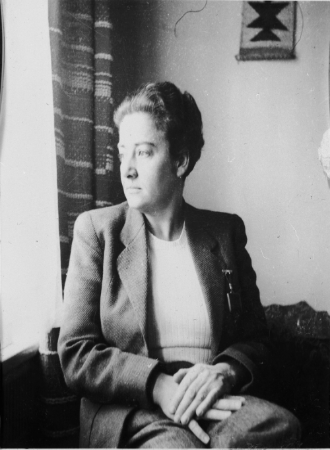
But I Was a Girl / maar ik was een meisje 1998
Distributed by First Run Features, 630 Ninth Avenue, Suite 1213, New York, NY 10036; 212-243-0600
Produced by Frame Mediaprodukties
Director n/a
VHS, color, 69 min.
High School - Adult
Gay and Lesbian Studies, Women's Studies, Music
Date Entered: 11/09/2018
Reviewed by Ellen Greenblatt, Auraria Library, University of Colorado at Denver... But I Was a Girl depicts the life of Frieda Belinfante (1904-1995), a fiercely independent, powerfully determined, and controversial figure, best known for being the first woman principal conductor of a professional symphony orchestra. Throughout this documentary, the story of a surprisingly resilient individual unfolds through Belinfante's own words supplemented by the reminiscences of her sister, significant other, former students, friends and colleagues.
Born in Amsterdam, the Netherlands on May 10 1904, Belinfante was the third daughter in a family of musicians. Her mother had hoped she would be a boy, but as Belinfante reminisces "... I have a lot of qualities that could have been a boy, but I was a girl." Her father, Ari Belanfante a concert pianist, made all his children study music, choosing the cello for Frieda. From the beginning, Belinfante was unconventional. She was very independent minded and chose to live her life as a lesbian, despite a brief marriage to the flautist Jo Veldcamp in the early 1930s. Her first true love was noted Dutch pianist and composer Henriëtte Bosmans with whom she had a seven-year relationship.
While Belinfante started her professional career as a cellist, she discovered that her true passion was conducting. In the late 1930s, she became the conductor of her own orchestra, "Het Klein Orkest," and consequently, the first professional female conductor in the Netherlands. Later, she journeyed to Switzerland to study with Herrmann Scherchen, winning a conducting competition against twelve men. However, with the breakout of World War II and the Nazi invasion of the Netherlands, opportunities for musicians shrank, especially Jewish musicians. Belinfante dismantled her orchestra and joined the resistance movement. She began by forging papers. Later she became a member of the underground group that bombed the Amsterdam City Hall and destroyed thousands of records about Dutch Jews who otherwise would have been deported to concentration camps. While the operation, which was staged in 1943, was a major victory for the Dutch underground, the group was betrayed and Belinfante was forced to go into hiding. She eventually made a perilous journey to Switzerland, where she spent the duration of the war in a Dutch refugee community.
After the war, Belinfante returned briefly to the Netherlands before emigrating to the United States, where she eventually made a living as a musician in the Hollywood film studios. In the early 1950s, Belinfante began to conduct an orchestra composed of Hollywood studio musicians. Originally called the Vine Street Musicians, the group evolved into the Orange County Philharmonic Society, which gave its first concert in 1954. Though successful, the group was disbanded in 1962, perhaps, as Belinfante herself surmises, in response to rumors of her lesbianism. Until she moved to Santa Fe, NM in 1991, she continued her work as a musician and teacher, fulfilling a lifelong commitment to working with young artists. Belinfante died of cancer in March 1995.
This documentary includes interviews interposed with sound recordings of Belinfante's music as well as archival materials pertaining to her life and work. Stock footage of the various places Belinfante lived is also included, but is frequently superfluous to flow of the documentary, making it much longer than it needs to be. The production quality is variable; both sound and picture are often fuzzy and indistinct. However, the subject material -- the fascinating and awe-inspiring life story of Frieda Belinfante -- rises above these mechanical flaws. The documentary won a "Gouden Beeld" (the Dutch Academy Award) and Best documentary, 7th International "Cinema della Donne" Film Festival, Turin, Italy (2000). Mostly in English, although some of the interviews are in Dutch with English subtitles.